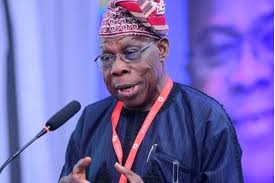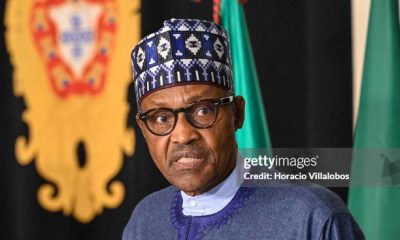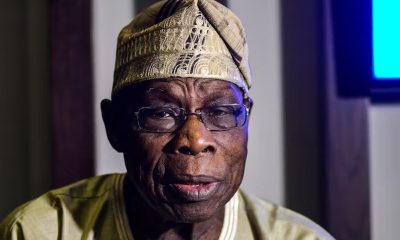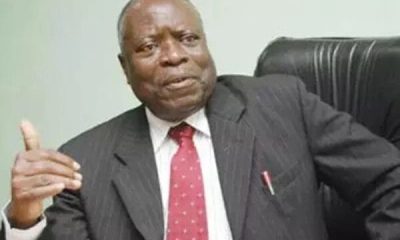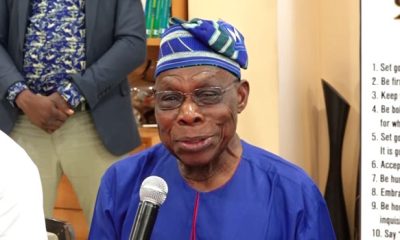Business
How Buhari reversed Nigeria’s 16-year economic gains -World Bank

Between 2015 and 2022, Nigeria witnessed a reversal of economic gains, as recorded by Presidents Olusegun Obasanjo, Umaru Yar’Adua, and Goodluck Jonathan between 1999 and mid-2015.
The World Bank disclosed this in its latest Nigeria Development Update (NDU), themed, ‘Staying the course: Progress amid pressing challenges’. It painted a grim picture of how policy inconsistency and contracting the oil sector conspired to lower the gross domestic product (GDP) per capita by about one-third between 2015 and 2022.
“Income gains from 2000-2014 were partially reversed from 2015. Inconsistent macroeconomic policies, the contracting oil sector and external shocks lowered GDP per capita by about one-third between 2015 and 2022, while comparator countries continued to prosper,” it explained.
The report noted that an unorthodox monetary and foreign exchange policy crisis contributed to the inflation surge witnessed during the period, saying the CBN maintained heavy-handed foreign exchange management and loose monetary policies, including monetary financing of the fiscal deficit and development finance interventions while parallel market exchange rate premium and inflation soared.
Also, during the Mohammadu Buhari era, the report said fiscal deficits widened and Ways and Means of financing by the Central Bank of Nigeria (CBN) skyrocketed, forcing a rapid increase in debt pressures.
While the Bank acknowledged the economic and social hardship attributable to President Bola Tinubu’s reforms, it stated that the policies are beginning to bear positive fruits.
It added: “Major policy reforms are starting to yield positive results. Despite the very large adjustments, GDP growth has been resilient and is being driven by services and slightly edged up in the first quarter of 2024, which is largely helped by stabilising oil output.”
It observed that the foreign exchange reforms have achieved a market-reflective exchange rate in the official market while the foreign reserve buffer is growing with the parallel exchange rate premium closed. It added that foreign exchange turnover has nearly doubled just as foreign reserves are almost $39 billion.
CBN’s renewed focus on achieving price stability, tightened monetary policy and improved transmission mechanisms anchored on market rates have excite the global financial institution.
While sacrificing an affordable lending rate, the CBN has increased the Monetary Policy Rate (MPR) by a cumulative 850 basis points since February 2024. It also substantially increased and standardised the cash reserve ratio and conducted large and market-priced open market operations (OMOs). The apex bank has also normalised standing facilities, made frantic efforts to halt new development finance loans and phased out ways and means of financing to redirect its attention to market-based debt instruments.
Whereas a revenue-driven fiscal consolidation is on course, the government fiscal deficit shrunk, thanks to contained expenditures and a surge in revenues, the report noticed.
Against popular belief that fuel subsidy claims the largest chunk of government revenues, the report has a contrary opinion. It revealed that the surge in revenues largely reflects the removal of the implicit foreign exchange subsidy, which was even larger than the premium motor spirit (PMS) subsidy.
It highlighted that in 2022, the combined direct fiscal cost of foreign exchange and PMS subsidies reached a staggering N10.7 trillion which was 5.3 per cent of the GDP.
Noting the giant strides that have been made since June 2023, the World Bank believes there is still more job to be done going forward. It charged the Tinubu-led administration to maintain a unified, market-reflective exchange rate and implement a comprehensive, systematic framework for CBN foreign exchange interventions to provide clarity to market participants as to when and how CBN may buy or sell foreign exchange.
Focusing on transparently supporting market liquidity and price discovery is also crucial while measures to build liquidity in the NAFEM, including easing remaining restrictions, and channelling oil-related inflows to the market should be prioritised as well, it advised.
The report also stressed that efforts should be geared towards maintaining a market-reflective petrol price and ensuring that the gains from the removal of subsidy flow to the federation.
It urged the Federal Government to strengthen non-oil revenues, reform the value-added tax (VAT) regime, rationalise tax expenditures and improve tax administration by adopting an e-invoicing system while strengthening tax audits.
It also charged the government to increase the transparency of oil revenues, improve the reporting of oil revenues to the Federal Account and Allocation Committee (FAAC) and conduct an audit to reconcile what is owed by the NNPC Limited to the federation.
To be socially responsible, the report cautioned those in government to cut lavish lifestyles by reducing the cost of governance and wasteful expenditures such as the purchase of vehicles and external training while lowering the cost of collection of ministries, departments and agencies of government as well as government-owned enterprises.
Noting that macroeconomic stabilisation is crucial, it should be accompanied by more targeted and urgent support to poor and economically insecure households.
While acknowledging that inflation has started to wane with improved monetary policy, it remains high and sticky, saying the battle is far from over.
“Inflation has started to fall overall, but it is still very high, at 32.7 per cent year-on-year in September 2024. Inflation and slow growth have contributed to increased poverty along with other shocks, such as COVID-19, past economic missteps and the current necessary course corrections have contributed to an increase in the share of Nigerians living in poverty,” it stated.
While most Nigerians feel that the cash transfer programme of the Federal Government is shrouded in secrecy, the World Bank is seeking scale-up and fast-tracking of the programme.
It said: “Direct benefit transfers of N25,000 are being rolled out to 15 million recipients and their families (over 60 million Nigerians). As of October 8, 4.4 million households have received at least one tranche of payment and 0.8 million have received a second tranche. The authenticity of the individuals is being validated through the National Identification Number (NIN) or the Bank Verification Number (BVN) before making payments directly into recipient bank accounts.”
However, it observed that low coverage of NIN/BVN among the poor and economically insecure population has adversely impacted the pace of the rollout of the direct benefit transfers.
In the reckoning of the Bretton Woods institution, the minimum wage, which is now pegged at N70,000 may not impact most Nigerians saying only 4.1 per cent of the working population will benefit from the pay raise.
Indeed, statistics show that 44.0 per cent of Nigerians are in non-wage employment, 43.6 per cent are not employed or in subsistence farming, while 12.4 are in other forms of employment. However, within the 12.4 per cent, only 4.1 per cent of that would be affected by the new minimum wage law.
The World Bank insisted that the Federal Government should follow up the macroeconomic stabilisation with the creation of productive jobs, arguing that poverty-reducing labour market policies are needed urgently to harness the potential of Nigeria’s young population.
In the next 10 years, the number of 15–24-year-old Nigerians is set to increase by more than 12 million and the high number of working-age people relative to those who are too young or old to work can give Nigeria a sizable demographic dividend while a lack of productive jobs could turn the demographic dividend to a demographic burden. It warned Nigeria that creating jobs is not enough to lift people out of poverty as high employment and high poverty can co-exist.
You may like
-
I could have been a drug addict—Obasanjo
-
FG, World Bank to provide jobs for 10 million youths in 5 years
-
Tinubu should be blamed for PDP crisis – Sowunmi
-
Obasanjo was not an idealleader to emulate—Presidency
-
Ondo Election: Buhari Celebrates APC’s Landmark Victory
-
Failing state status of Nigeria is glaringly evident, laments Obasanjo
-
Shettima reaffirms Nigeria’s commitment to addressing malnutrition
-
20m out-of-school children potential Boko Haram recruits, Obasanjo warns
-
World Bank Approves Fresh $1.57bn Support Fund For Nigeria
-
Operation Feed the Nation would’ve enhanced food sufficiency—Obasanjo
-
Ex-ICPC Chairman Ayoola’s Enduring Legacy Praised by Obasanjo
-
Witches, Wizards Delayed My Birth — Obasanjo
Business
Tax Reform Bills scales second reading in Senate

The Senate has passed for second reading fours bills designed to reform Nigeria’s tax system.
This followed the presentation of the general principles of the bills by the Senate Leader, Opeyemi Bamidele (APC-Ekiti), during plenary on Thursday.
The four bills, which were first read on Oct. 30, are:o Joint Revenue Board of Nigeria Establishment Bill, 2024; Nigeria Revenue Service Establishment Bill, 2024; Nigeria Tax Administration Bill, 2024 and the Nigeria Tax Bill, 2024.
Leading the debate on the general principles of the bills, Opeyemi said
that they represented a significant move toward overhauling the country’s tax system.
He said that the bills were aimed at simplifying the tax landscape, reducing the burden on small business and streamlining how taxes would be collected.
According to him, the four bills seek to ensure uniformity in tax revenue administration in the country, in accordance with the provisions of the constitution and eliminate the incidence of double taxation across the country.
He said that the bills also sought to deploy taxation as a tool for encouraging private sector investments in critical industries and boosting individuals’ disposable incomes through targetted tax exemptions, as captured in the various bills.
“In the area of tax exemptions, there is a proposal to exempt small business operators, while those with annual turnover of N50 million or less are equally exempted from payment of taxes.
“Similarly, there is a reduction in company’s income tax from the current 30 per cent to 25 per cent by 2026.
“As part of deliberate attempt to curtail incidence of double taxation and multiplicity of taxes and levies, multiple taxes hitherto paid by companies under various tax heads namely: 2.5 per cent education tax, 0.25 per cent NASENI tax have been harmonised into a development levy of two per cent.
“This will be applied by 2030 to fund the newly-established student loan scheme which will benefit many Nigerian youths.
” Unlike like what is obtainable under the existing tax regime whereby the Federal Government takes a lion share of VAT revenues, it is proposed that the sharing formula should allow state governments to share 55 per cent of VAT revenue from the current 15 per cent to 10 per cent sharing formula,” he said.
He, however, said local governments share of VAT revenue remained unaffected.
“Relatedly, basic items consumed by Nigerian households, such as food items, medical services and pharmaceuticals, educational fees, electricity, etc. are exempted from VAT.
“Again, as part of efforts to ease the administration of income taxes and levies across the federation, there is a reasonable effort made to consolidate core tax statutes and related tax legislations,” he said.
The senator said that the bills contained innovative and people-oriented proposals as part of government’s deliberate fiscal and tax reform measures.
He said that the bills were meant to cushion the effects of the ongoing broader economic policies, such as the removal of subsidy on petroleum products.
Opeyemi said that the innovations were also tailored toward implementing cost-reflective electricity tariffs in the power sector.
He urged the lawmakers to see the bills as part of the required legislative intervention to support the ongoing fiscal and tax reform measures needed to reposition the Nigerian economy for growth and productivity.
“These bills should be considered with great sense of patriotism and exercise of the powers of the National Assembly under Section 59 of the 1999 Constitution regarding imposition of taxes.
“I, therefore, urge my distinguished colleagues to support the bills for second reading.
Contributing, Sen. Seriake Dickson (PDP-Bayelsa) lauded the bills, saying that they would entrench the much-canvassed fiscal federalism.
However, Sen.Ali Ndume (APC-Borno) said although he was not against reforms and tax reforms in Nigeria, he, however, said that the timing of the bills was the issue.
Ndume said that the issue of derivation proposed in the bills was contradictory, stressing that the constitution needed to be amended for some of the proposals in the bills to sail through.
He said that in inline with the positions of the governors and traditional rulers, the bills should be withdrawn for further consultations.
Ndume specifically said that the issue of VAT and derivation should be addressed, adding that senate should consult first before further legislative inputs could be made on the bills.
However, Senate Chief Whip, Sen. Mohammed Monguno (APC-Borno), vehemently disagreed with Ndume, saying that his position negated the senate rule on processes of lawmaking.
He said Section 60 of 1999 Constitution, as amended, empowered the senate to regulate its procedure.
According to Monguno, the process of law-making, as stated in the senate’s rule, was unambiguous, nothing that after second reading, the bill will be transmitted for public hearing, where Nigerians of all groups will be free to make their inputs on the bills.
The senator said that Ndume’s suggestion for senate to withdraw the bills was foreign to legislative process, describing the suggestion as an academic exercise that was not worthy of legislative consideration.
According to him, the bills are noble and pro-people, as it will reduce the tax burden on Nigerians.
President of the Senate, Godswill Akpabio, after the reading of the bills for the second time, said all concerned stakeholders, should be invited at the public hearing to make their inputs before final clause-by-clause consideration by the senate.
He consequently referred the bills to Senate Committee on Finance for further legislative inputs, with a directive to return back to plenary in six weeks.
Business
UBA to begin full banking operations in France
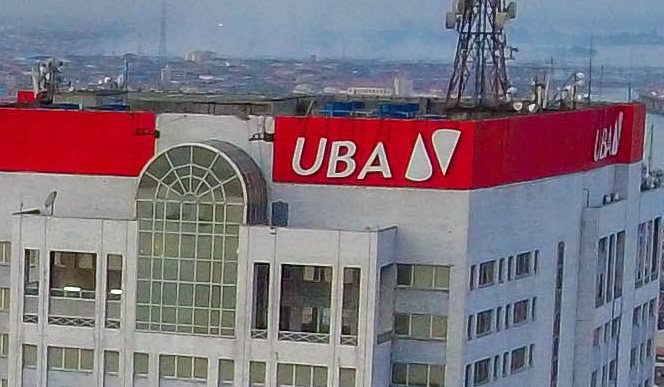
The United Bank for Africa has signed a deal to commence full banking operations in France.
In a statement late Thursday, the banking group said the landmark business cooperation agreement with the French Finance Minister, Antoine Armand, was part of President Bola Tinubu’s state visit to France.
During the visit, the Chairman of UBA Group, Tony Elumelu, in the presence of Tinubu and the President of France, Emmanuel Macron, signed the agreement indicative of support by the French Government for the development of UBA’s full banking operations in France.
Speaking at the signing ceremony, Elumelu said, “This partnership reinforces our commitment to seamless international banking services for our customers, not just across the 11 Francophone African countries we serve, but Africa as a whole and French and European customers transacting with Africa.
“Expanding into France is a natural progression, with Paris serving as our European Union hub as we continue to bring Africa and the world together through innovative financial solutions. Paris will join London, New York, and Dubai as a critical component of our unique global network.”Related News
With this agreement, UBA joins tier-1 banks in Nigeria, running with a banking presence in France.
Tinubu arrived in France on Thursday for a two-day state visit, with both sides looking to deepen their economic and diplomatic ties.
It is the first official state visit to Paris by a Nigerian leader in over two decades.
Macron welcomed his counterpart with a warm greeting in Nigerian Pidgin English, stressing the cultural connection between the two leaders.
“Na big honour for France to welcome you for dis state visit,” he wrote on social media.
Business
CBN sets new guidelines for FX trading
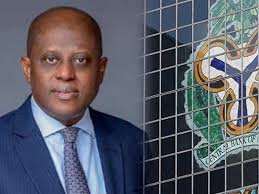
The Central Bank of Nigeria (CBN) on Wednesday announced new guidelines for foreign exchange (FX) trading through the Electronic Foreign Exchange Matching System (EFEMS).
CBN’s director of the Financial Markets Department, Omolara Duke, made this in a statement, stating that the new guidelines aim to ensure transparency, fairness, and compliance in FX trading.
The minimum tradable amount is set at $100,000; CBN disclosed this in a tweet, adding it will be effective December 2, 2024.
“The CBN transitions FX trading to Bloomberg BMatch, promising enhanced transparency, fair pricing and operational efficiency, effective December 2, 2024,” the apex bank tweeted.
CBN also stated that the Bloomberg BMatch platform will boost market integrity, enhance price discovery, and ensure seamless FX trading among participants.
General Provisions
1. These guidelines regulate the operations of interbank FX trading via the Electronic Foreign Exchange Matching System (EFEMS),
2. The purpose is to ensure transparent, fair, and efficient FX trading, minimising counterparty risk and ensuring compliance with Central Bank of Nigeria (CBN) regulations. and greater
3. The CBN has approved the Bloomberg BMatch as the designated platform to support the EFEMS for interbank trading. advised to
4. All market participants are required to comply strictly with these guidelines and any amendments as may be issued by the CBN from time to time.
Trading and Operational Requirements
1 Trading hours shall be from 09:00 hrs to 16:00 hrs WAT on business days.
2 All unmatched orders will be cleared at the market’s close and may be resubmitted on the
following business day.
3 Quotes on EFEMS will remain anonymous until matched. Once matched, counterparty details will be revealed for settlement purposes.
4 All trades consummated on EFEMS are binding, unless canceled by mutual agreement of both parties with written approval from the CBN.
5 The minimum tradable amount is US$100,000.00, with incremental clip sizes of US$50,000.00.
6 Participants must set credit and settlement limits for other counterparties in the system.
Transactions exceeding these limits will not be executed.
7 Participants must have adequate credit and settlement limit set for the CBN as its counterparty bank.
8 Participants are required to comply with the Nigerian Foreign Exchange Code and other CBN regulations.
9 EFEMS shall be used exclusively for executing spot FX transactions involving the Nigerian Naira (NGN) against the United States Dollar (USD). Other currency pairs may be introduced upon the CBN’s directive.
10 Transactions on EFEMS must be settled through approved settlement systems, with participants
bearing responsibility for their obligations.
1 The platform provider must offer real-time support to address system issues. In the event of prolonged downtime, alternative trading protocols will be activated as prescribed by the CBN.
12 Any participant defaulting on settlement obligations will face penalties as determined by the CBN.
Governance and Data Reporting
1 The CBN shall monitor all transactions on EFEMS to ensure market integrity and transparency.
2 Participants must submit daily transaction reports only to the CBN, detailing trade volumes, counterparties, and settlement status. All whole/interbank trades conducted between Authorised Dealers and non-banks participants on telephone and other acceptable channels in the market must be confirmed on the RFQ and reported on EFEMS immediately. Any deal that falls outside the EFEMS parameters, such as same day or next day settlements delivery vs payment transactions where limits are exceeded and deals with non-standard amount should be booked via the RFQ functionality and uploaded automatically to the FX blotter not more than 10 minutes after the completion of the trade.
3 All trade data generated on EFEMS shall be owned by the CBN. The CBN reserves the right to publish aggregated or disaggregated data for market analysis, subject to confidentiality agreements.
4 The CBN reserves the right to review EFEMS operations, including participant activities and system efficiency, periodically.
5 Violations of these guidelines or other applicable regulations shall attract penalties, including suspension or revocation of EFEMS access rights.
Business
Naira appreciates against dollar despite CBN interest rate hike

Despite the announcement of an interest rate hike by the Central Bank of Nigeria (CBN) on Tuesday, the naira appreciated to N1, 659.44 against the US dollar.
Data from the Nigerian Autonomous Foreign Exchange Market (NAFEM) showed a N16.88 gain against the dollar from the N1, 675.62 it traded at on Monday.
A look at the parallel section of the foreign exchange market showed a gain of N5 for the naira against the dollar, trading at N1,750 compared to the N1,755 it traded at on Monday.
The naira, however, didn’t record any change in trade against the British pound on Tuesday as it still exchanged at Monday’s rate of N2,245 against the pound.
Also, the naira maintained N1,300 against the Canadian dollar but appreciated marginally against the Euro to trade at N1,840/€1 as against the previous day’s rate of N1,845/€1.
Business
CPPE raises concern over CBN’s MPR hike to 27.50%

The Centre for the Promotion of Private Enterprise (CPPE) has raised concerns over the Central Bank of Nigeria’s (CBN) sustained tightening of the Monetary Policy Rate (MPR), now at 27.50 per cent.
Dr Muda Yusuf, Chief Executive Officer of CPPE, stated in Lagos on Tuesday that the continued rate hikes by the Monetary Policy Committee (MPC) could further stifle economic growth.
NAN reports that the MPC of the CBN, during its 298th meeting, further raised the country’s interest rate to 27.50 per cent from 27.25 per cent.
It, however, retained the Cash Reserved Ratio (CRR) at 50 per cent for Deposit Money Banks and 16 per cent for merchant banks.
The committee also retained the Liquidity Ratio at 30 per cent, and also the Assymetric Corridor at +500/-100 basis points around the MPR.
“It is troubling that despite the declining growth performance of many critical sectors of the economy as evidenced in the third quarter GDP report, the MPC still continued its tightening stance.
“The GDP sectoral performance report also revealed a glaring disconnect between the financial services sector and the real economy,” he said.
He said that the financial services sector recorded a growth of 32 per cent while agriculture and manufacturing grew by 1.14 per cent and 0.92 per cent.
Yusuf said, “This disposition will deepen this distortions. Meanwhile strategic economic sectors such as agriculture, manufacturing and real estate recorded declines in growth in the third quarter.
“Air transport and textile remained in recession. These sectors need monetary and fiscal support, not a further tightening of monetary conditions.
The financial expert called on CBN to increase support for development finance institutions to address financing challenges caused by the sustained tight monetary policy regime.
Business
Breaking: CBN increases interest rate to 27.5%
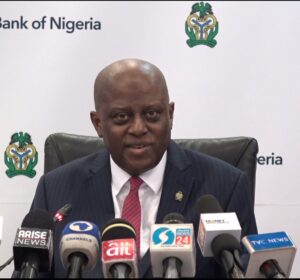
The monetary policy committee (MPC) of the Central Bank of Nigeria (CBN) has raised the monetary policy rate (MPR), which benchmarks interest rates in the country to 27.50 percent — from 27.25 percent.
Olayemi Cardoso, CBN’s governor, announced the committee’s decision at a press conference on Tuesday after the panel’s 298th meeting in Abuja.
He said the committee increased the MPR by 25 basis points.

2025: How To Plan A Budget For The Upcoming Year

Ruud van Nistelrooy Opens Up on Hurtful Manchester United Exit Before Taking Leicester City Job

Obasanjo would have died under Abacha if not for me -Gowon

Why I don’t trust any public institution in Nigeria – Fisayo Soyombo

Minimum Wage: Cross Rivers Workers to embark on indefinite strike

Bayer Leverkusen Forward Victor Boniface Faces Possible Sanction for Reckless Driving Incident

Radda approves N70,000 minimum wage for Katsina workers

PH refinery has not commenced bulk sales – NNPC

CBN issues Dec. 1, ultimatum against banks, ATM delays

